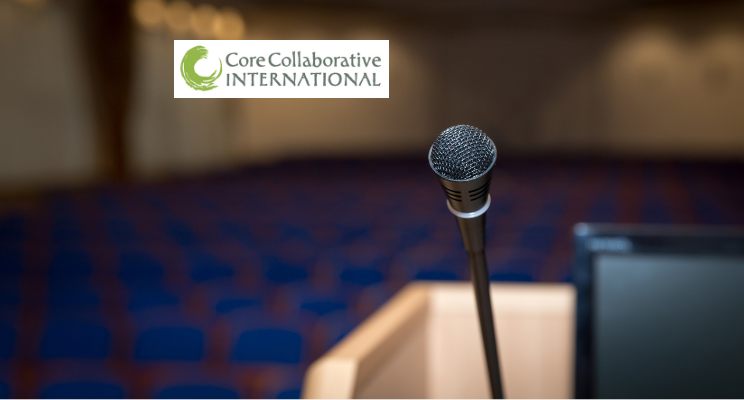CoreCollaborative International team members are contributing to the training and development of international education professionals by delivering presentations at a variety of professional conferences around the world. Over the past few years, team members have shared findings on a diverse range of topics with colleagues across multiple platforms, including at the American Association of Colleges & Universities (AAC&U), NAFSA: Association of International Educators, the Workshop on Intercultural Skills Enhancement (WISE), and the International Virtual Exchange Conference (IVEC).
Most recently, CCI teamed up with colleagues from Florida International University and DePaul University to present “Integrating Global Learning into General Education: Ensuring Access and Equity” at the fall 2023 AAC&U conference. Moderated by AAC&U Director of Innovative Global Education Initiatives Veronica Onorevole, the panel focused on ways in which educators can infuse global learning into general education initiatives. Starting from AAC&U’s Guidelines for Global Learning, FIU’s Stephanie Doscher and DePaul’s Gian Mario Besana discussed ways in which their respective institutions map global learning outcomes to general education requirements. CCI’s Jennifer Jones-Wiley addressed best practices for infusing global perspectives into curriculum design. She stressed that intercultural competencies must be intentionally integrated into general education coursework and that faculty must, with training, teach and model skills like tolerance of ambiguity, complex thinking, self-awareness, and emotional intelligence. Discussing successful partnerships that have enhanced global learning, Jones-Wiley cited CCI’s inter-institutional work with the National Aeronautics and Space Administration (NASA). The NASA-CCI partnership has brought home how important it is for STEM-oriented students, as for all students, to learn the foundational intercultural skills that will equip them, as professionals, to solve problems from diverse perspectives.
Spring 2022’s NAFSA conference had Jones-Wiley present, alongside Christa Uehlinger from Eastern Switzerland University of Applied Sciences and Stacey Hansen from SUNY–Albany, a workshop entitled “Evidence-Based Approaches to Intercultural Learning.” The workshop was predicated on the notion that, to achieve real intercultural learning outcomes, educators should understand how to engage learners in all their social, emotional, and cognitive facets. Presenting a holistic framework founded on recent studies in global learning, the four-hour workshop relied on a compelling combination of whole group briefings and debriefings, presentations of research, small group breakouts and exercises, and individual reflection. Participants engaged in hands-on activities and created a concrete “Whole Learner Plan” which they committed to implement on their home campuses. At the end, each participant returned to their campus, equipped to implement their plan, and supported by a variety of resources which had been shared by the presenters.
At 2020’s WISE Conference, Jones-Wiley was joined by fellow CCI team member Kris Acheson-Clair to present “Assessment as an Intercultural Learning Method in Education Abroad.” Their session focused on assessment as pedagogy, also known as formative assessment, baseline analysis, feedback to learners, and in-process evaluation. In their presentation, Jones-Wiley and Acheson-Clair argued that the field of education abroad needs a clearly delineated set of evidence-based best practices specifically for using assessment pedagogically. They presented models that education abroad professionals can follow to put principles into practice at the program level, as well as models for scaling up learning and assessment to ever larger groups of students. In contrast to the more traditional concept of program evaluation which gets at how students felt about their experiences, Jones-Wiley and Acheson-Clair discussed the assessment of learning outcomes as a framework for continued reflection which encourages iterative or cyclical learning approaches. They highlighted different assessment instruments including the Beliefs, Events and Values Inventory (BEVI), the IES Intercultural Assessment, and mapping assessments – all tools that encourage student reflection within a growth mindset.
Finally, CCI team members Jones-Wiley and Acheson-Clair again teamed up – this time with Carine Ullom of Ottawa University – to present a workshop on “Virtual Exchange Instructional Design for Intercultural Outcomes,” as part of 2020’s IVEC. Designed to introduce participants to a framework for designing meaningful virtual exchange experiences, the workshop leaders guided participants in articulating intercultural learning outcomes essential to student success, then applied backward instructional design principles to create meaningful learning experiences that involve virtual exchange. Participants had come to the conference with their own ideas for virtual learning, which they then applied using the framework outlined in the workshop. Participants came away with practical insight on innovative intercultural learning activities, and assessment strategies that work well in virtual spaces, as well as awareness of a wide variety of intercultural resources that can be applied to virtual exchange learning.
Throughout these various workshops and presentations, as well as in published scholarship, CoreCollaborative International team members generously share the findings of their own work, and of CCI’s long experience working in the intercultural education space. Additional information on these presentations can be found on CCI team members’ LinkedIn pages, or on the CCI website. Spreading knowledge and expertise through regular engagement with the professional community, CCI is paying it forward to intercultural educators from a variety of disciplines. Together, they function as a community of like-minded professionals working to apply transformative approaches to learning.
